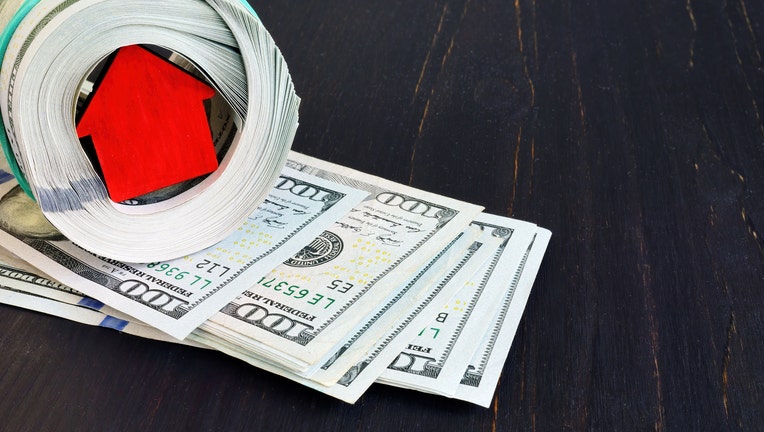Pros and cons of a cash-out mortgage refinance

Like any financial move, doing a cash-out refinance has its pros and cons. Here's what you need to know before getting started. (iStock)
If you've been following the news lately, you know that mortgage rates are at historic lows amid the coronavirus pandemic. Typically, when mortgage interest rates are low, borrowers refinance in order to lower their monthly payments. However, with a cash-out mortgage refinance it’s also possible to use the equity that you’ve built up in your home to cover a big expense.
You can visit an online marketplace like Credible to view current refinance rates and get cash out of your home to pay off high-interest debt.
Pros of a cash-out mortgage refinance
Like any type of financial move, doing a cash-out mortgage refinance has its own pros and cons. In order to help you decide whether this type of refinancing is right for you, we’ve laid them out below. Keep reading to learn more.
- Lower interest rates
- Pay down other debts and improve credit
- Possible tax deductions
1. Lower interest rates
The good news is that low interest rates aren't just for new homebuyers. Mortgage refinance rates are at historic lows as well. If it's been a while since you first took out your home loan, there's a good chance that you can cash in on the record low refi rates and secure a much lower rate on your new mortgage.
Put simply, low rates matter when it comes to your monthly payment. In a cash-out refinance scenario, if the rate on your refinance mortgage is much lower than your original rate, you may be able to leverage the equity in your home while still making a payment that is similar to the one you're paying now.
You can start to explore your mortgage refinance options by visiting Credible to compare rates and lenders.
EVERYTHING YOU NEED TO KNOW ABOUT MORTGAGE REFINANCE
2. Pay down other debts and improve credit
Aside from taking advantage of the low mortgage refi rates, doing a cash-out mortgage refinance can help you pay down other debts. In this case, you borrow more money than you currently owe on the home and the difference is given to you in cash. After the refinance is done, you can use the money however you see fit, including to pay off existing debt.
Best of all, paying off your debts may even help you improve your credit score. After all, your credit utilization ratio, or the measure of how much credit you're currently using compared to how much you have available, accounts for 30% of your credit score. When you pay off your debts your ratio will be lower, which means that your credit score should go up.
You can compare mortgage refinancing rates from multiple lenders at once via an online tool like Credible without affecting your credit score.
IS CASH-OUT REFINANCING A GOOD IDEA?
3. Possible tax deductions
Luckily, when you do a cash-out refinance, the IRS does not view the money that is given to you as income. Instead, it views the money as an additional loan, which means that you may be able to deduct the interest from your cash-out refinance on your taxes.
In this instance, many of the tax implications depend on how you intend to use the money. IRS Publication 936 covers the particulars of the home interest tax deduction in detail. In general, though, you can only deduct the interest if you put the money towards an improvement that significantly increases the value of your home.
The best way to determine if you have the right amount of loan-to-value ratio to qualify for a cash-out refinance is to visit a marketplace like Credible. Just enter your loan amount and see if a loan refinance makes financial sense.
HOW DOES A CASH-OUT REFINANCE AFFECT TAXES?
Cons of a cash-out mortgage refinance
While there are certainly many benefits of a cash-out refinance (like the ones listed above), there are also some aspects that may give you pause, such as:
- Closing costs
- Potential PMI
- Run the risk of using your home like a bank
1. Closing costs
One of the biggest disadvantages of doing a mortgage refi is that this move does come with closing costs. Remember, when you refinance, you’re essentially taking out a new loan to pay off your existing one.
Just like when you took out your first mortgage, you’ll be responsible for covering the costs and fees necessary to close on your new loan. Typically, your closing costs will amount to between 2% and 5% of the loan amount.
HOW TO REFINANCE YOUR MORTGAGE WITHOUT CLOSING COSTS
2. Potential PMI
Depending on how much you borrow, you may also have to budget for additional costs, like private mortgage insurance (PMI). Whenever you have less than a 20% stake in the home, lenders will require you to carry PMI. If you want to avoid this additional fee, be sure to ask your lender how the amount that you are borrowing will affect your loan-to-value ratio.
HOW DO I GET RID OF PMI ON MY MORTGAGE?
3. Run the risk of using your home like a bank
Lastly, once you do a cash-out refinance, you run the risk of seeing your home like a bank or ATM rather than your largest asset. Generally, mortgage refinance servicers recommend only using a cash-out refinance to cover big, one-time expenses, like renovation costs, medical debt or education costs.
The bottom line
If you’re interested in taking advantage of the current refinance rates while saving on mortgage payments or leveraging the equity in your home, your best bet is to talk to a mortgage lender.
With Credible, you can compare multiple mortgage lenders at once and see what kind of refinance rates you qualify for within just minutes. Plus, it doesn't impact your credit score.

